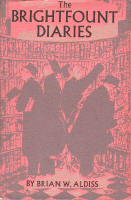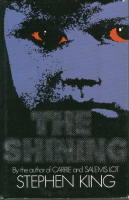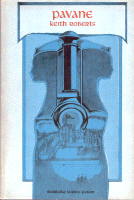|
Collecting
Science Fiction and Fantasy
from
Fantastic
Literature
Whether you're a true bibliophile or
just someone who loves to read, book
collecting is an enjoyable, and
sometimes a profitable way to enhance a
favourite hobby or pastime. There are
lots of ways to start collecting books.
Avid readers are usually already book
collectors because of the very nature of
their hobby or pastime - they love
reading. Most avid readers are partial
to certain types of books, whether
they're mysteries, science fiction,
adventure or romance. Among these
genres, you will soon realise that there
are more science fiction books on the
shelf than any other.
 First editions of certain authorsí works
are sometimes very valuable. Value is
determined by how popular an author has
become and how scarce their books have
become. The print run of some books,
particularly UK editions, can be very
low indeed with most going to libraries.
First editions of certain authorsí works
are sometimes very valuable. Value is
determined by how popular an author has
become and how scarce their books have
become. The print run of some books,
particularly UK editions, can be very
low indeed with most going to libraries.
There are many other categories you
might consider when beginning a book
collection besides favourite authors.
You could choose to collect works of a
certain illustrators, or distinctive
book formats (i.e.) miniature books or
those in slip covers, certain types of
bindings, or award winners - for Science
Fiction these include the Nebulas and
the Hugos, for Horror there's the
Stokers and for Fantasy, the World
Fantasy Award and others, many of which
can be found on our website. There's
ARCs (advance reading copies), authorsí
first books, or only those signed by the
author. You might decide you'd like to
collect books published in the 1930s, or
ones printed a few hundred years ago.
Authors to consider in the Science
Fiction genre are Brian Aldiss, Keith
Roberts, J.G. Ballard, Philip K. Dick,
Peter F Hamilton, Adam Roberts, Iain
Banks, and China Mieville.
Collectable fantasy authors include
David Eddings (Belgariad), George R.
Martin, J.R.R. Tolkien, Mercedes Lackey
and David Gemmell.
Those of a more bloodthirsty nature may
prefer horror stories written by authors
such as Joe Lansdale, HP Lovecraft,
Basil Coppr, Hugh B Cave, Stephen King
and Dean R Koontz.
 Caring for your book collection is also
another important consideration.
Whenever possible, books should be
stored vertically and on a bookshelf.
Never cram them tightly together as
damage could occur when taking a book on
or off the shelf. Make sure that the
volumes are never exposed to direct
sunlight otherwise print fades and pages
yellow. If you don't have a lot of room
in your house, itís okay to store books
in boxes. But again make sure to align
them vertically in the box if you can.
Also make sure the boxes are small
enough for easy handling and can be
tightly sealed to protect the books from
various damaging elements.
Caring for your book collection is also
another important consideration.
Whenever possible, books should be
stored vertically and on a bookshelf.
Never cram them tightly together as
damage could occur when taking a book on
or off the shelf. Make sure that the
volumes are never exposed to direct
sunlight otherwise print fades and pages
yellow. If you don't have a lot of room
in your house, itís okay to store books
in boxes. But again make sure to align
them vertically in the box if you can.
Also make sure the boxes are small
enough for easy handling and can be
tightly sealed to protect the books from
various damaging elements.
Don't store books in lofts or sheds.
Both extremes - heat or possible damp or
moisture - can be very detrimental for
books. The ideal temperature to store
them in is around 70 degrees Fahrenheit
and at a relative humidity of about 50%.
A room with year round air conditioning
is ideal. Mould or mildew is another
consideration.
 Advanced mould growth can do irreparable
harm and make prized first editions
virtually worthless. If mould does
become a problem and itís caught early
enough, the best thing to do is move the
books to a drier location and expose
them to air or sunlight. Try and dust
your books at regular intervals too,
about once a year.
Advanced mould growth can do irreparable
harm and make prized first editions
virtually worthless. If mould does
become a problem and itís caught early
enough, the best thing to do is move the
books to a drier location and expose
them to air or sunlight. Try and dust
your books at regular intervals too,
about once a year.
Mice, silver fish, cockroaches and other
paper-loving pests can damage your book
collection beyond repair. To avoid such
infestations store your most prized
books in individually sealed bags or
air-tight containers. If you're still
having trouble with certain types of
insidious pests, discuss the problem
with a reputable exterminator.
Hereís a few more things, you, the Book
Collector can do to protect your
everyday books and your prized book
collection:
-
Don't eat or drink while reading
unless you didn't want to keep that
particular volume in your collection
anyway.
-
Never read in the bath!
-
Don't bend the books spine or dog ear
the pages - that's what book marks are
for.
-
Never loan out your favourite books.
If you do manage to get them back
they'll likely be returned in less
than pristine condition.
-
Don't write in your books - use
personalised bookplates.
-
Keep favourite books on the bookshelf
and not on the coffee table where
visitors or pets can abuse them -- as
coasters or chew toys.
Happy collecting!
|

